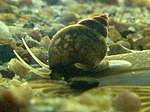Schistosoma is a genus of trematodes, commonly known as blood flukes. They are parasitic flatworms responsible for a highly significant group of infections...
42 KB (4,027 words) - 10:52, 2 September 2024
Schistosoma japonicum is an important parasite and one of the major infectious agents of schistosomiasis. This parasite has a very wide host range, infecting...
18 KB (2,259 words) - 15:26, 18 November 2024
Schistosoma mansoni is a water-borne parasite of humans, and belongs to the group of blood flukes (Schistosoma). The adult lives in the blood vessels (mesenteric...
57 KB (6,881 words) - 18:00, 20 November 2024
Schistosoma haematobium (urinary blood fluke) is a species of digenetic trematode, belonging to a group (genus) of blood flukes (Schistosoma). It is found...
28 KB (3,471 words) - 13:46, 18 November 2024
Schistosoma mekongi is a species of trematodes, also known as flukes. It is one of the five major schistosomes that account for all human infections,...
8 KB (1,058 words) - 22:21, 3 December 2023
Schistosoma intercalatum is a parasitic worm found in parts of western and central Africa. There are two strains: the Lower Guinea strain and the Zaire...
12 KB (1,617 words) - 17:42, 3 November 2023
Schistosoma spindale is a species of digenetic trematode in the family Schistosomatidae. It causes intestinal schistosomiasis in the ruminants. The distribution...
12 KB (1,052 words) - 06:45, 3 December 2023
Schistosoma hippopotami is a species of digenetic trematode that belongs to the genus of blood flukes (Schistosoma) that is found in sub-Saharan Africa...
12 KB (1,408 words) - 22:41, 23 January 2024
spinal-cord inflammation are possible. Manifestation of acute infection from schistosoma include cercarial dermatitis (hours to days) and acute systemic schistosomiasis...
95 KB (10,086 words) - 05:37, 4 November 2024
Schistosoma bovis is a two-host blood fluke, that causes intestinal schistosomiasis in ruminants in North Africa, Mediterranean Europe and the Middle...
19 KB (2,083 words) - 15:15, 20 September 2024
Schistosoma nasale is a species of digenetic trematode in the family Schistosomatidae. S. nasale inhabits blood vessels of the nasal mucosa and causes...
4 KB (474 words) - 12:48, 3 December 2023
Schistosoma malayensis is a schistosome parasite. It was first described in 1988 in Peninsular Malaysia and appears to be a zooenotic infection. The species...
6 KB (715 words) - 05:47, 22 October 2021
in vertebrates. The best studied group, the blood flukes of the genus Schistosoma, infect and cause disease in humans. Other genera which are infective...
11 KB (1,409 words) - 03:13, 24 December 2023
Carcinogenic parasite (section Schistosoma haematobium)
medically-proven carcinogenic parasites, namely the urinary blood fluke (Schistosoma haematobium), the Southeast Asian liver fluke (Opisthorchis viverrini)...
20 KB (2,277 words) - 13:40, 15 April 2024
Schistosoma indicum is a species of digenetic trematode in the family Schistosomatidae. The parasite is widespread in domestic animals in India and other...
5 KB (556 words) - 12:52, 3 December 2023
Schistosoma ovuncatum is a schistosome parasite, first described in 2002. Its recognition as a new species only occurred when zoologists were re examining...
1 KB (126 words) - 04:37, 22 May 2023
vessels such as the genus that causes schistosomiasis, the genus of Schistosoma. Including what lives in the lung such as the genus of Paragonimus. These...
10 KB (1,593 words) - 20:30, 10 February 2023
medicine. He is best remembered as the discoverer of the blood fluke Schistosoma haematobium, the causative parasite of bloody urine (haematuria) known...
53 KB (5,427 words) - 01:17, 12 November 2024
species of schistosomes that infect humans are members of the genus Schistosoma. The seven major species of non-schistosomes that infect humans are listed...
24 KB (2,488 words) - 17:12, 17 October 2023
Archived from the original on 18 July 2011. Retrieved 21 February 2011. "Schistosoma". Australian Society for Parasitology. Retrieved 19 February 2011. Cercaria...
9 KB (940 words) - 23:55, 25 June 2024
Theodor Bilharz discovered the first known blood flukes, Schistosoma haematobium and Schistosoma mansoni, and with it the disease bilharzia (schistosomiasis)...
8 KB (797 words) - 21:53, 16 November 2024
in rats. They found that infecting the rats with the parasitic worm Schistosoma mansoni resulted in alleviated colitis effects. According to Weinstock...
21 KB (2,473 words) - 23:08, 7 October 2024
rarely pose a health risk. However, it does caution that in areas where Schistosoma haematobium, a parasitic flatworm, is prevalent, it can be transmitted...
24 KB (2,534 words) - 13:27, 14 November 2024
serving as hosts for Schistosoma mansoni, Fasciolopsis and other parasitic groups. The tiny Bulinus snails are hosts for Schistosoma haematobium. Lymnaeid...
22 KB (2,032 words) - 15:31, 25 September 2024
bilharzia, bilharziosis or snail fever), a disease caused by the fluke worm Schistosoma, is "second only to malaria as the most devastating parasitic disease...
98 KB (9,825 words) - 00:31, 19 November 2024
a carrier for many diseases. Parasites of Bandicota indica include: Schistosoma spindale Angiostrongylus cantonensis Leptospirosis Hantavirus Babesiosis...
5 KB (595 words) - 06:38, 20 November 2024
duodenale Hymenolepis nana Taenia saginata Enterobius Fasciola hepatica Schistosoma mansoni Toxocara canis Toxocara cati Helminthiases are classified as...
62 KB (5,352 words) - 09:39, 11 October 2024
Parasitism Schistosomiasis – a disease caused by parasitic flatworms called schistosomas Lymphatic filariasis caused by filarial worms Dracunculiasis caused by...
32 KB (3,740 words) - 17:39, 5 November 2024
immune response against infection by certain parasitic worms, including Schistosoma mansoni, Trichinella spiralis, and Fasciola hepatica. IgE is also utilized...
28 KB (3,269 words) - 04:10, 4 November 2024
Blood fluke Schistosoma mansoni / S. japonicum / S. mekongi / S. haematobium / S. intercalatum Schistosomiasis Trichobilharzia regenti Swimmer's itch...
38 KB (3,759 words) - 01:12, 31 October 2024




















